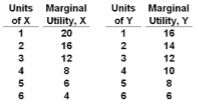A perfectly price discriminating monopolist charges each buyer:
A. more than his or her reservation price.
B. exactly his or her marginal cost.
C. the perfectly competitive equilibrium price.
D. exactly his or her reservation price.
Answer: D
You might also like to view...
vRefer to the data. If the price of X decreases to $2, then the utility-maximizing combination of the two products is:

Answer the question on the basis of the following marginal utility data for products X and Y. Assume that the prices of X and Y are $4 and $2 respectively and that the consumer's income is $18.
A. 2 of X and 5 of Y.
B. 4 of X and 6 of Y.
C. 6 of X and 3 of Y.
D. 4 of X and 5 of Y.
Marginal utility equals the change in total utility divided by
A. the price of the product. B. the change in the number of units consumed. C. the number of units consumed. D. the consumer's subjective level of preference.